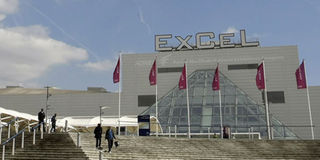G20 summit to focus on Obama

A general view shows the ExCel Exhibition and Conference Centre which will host the G20 summit this week in East London March 30, 2009. Photo/REUTERS
Once more, the focus turns to Barack Obama. This time, the occupant of the world’s most powerful office gets a baptism with fire as he attends a summit in London called to battle the most serious financial crisis in recent memory.
Already, the UN has warned that 53 million more people may fall into absolute poverty this year as a result of the crisis and the US has spent over a trillion dollars to try to stop the downward spiral of its economy.
Seeing signs of danger, the World Trade Organisation (WTO) has warned that trade was contracting at a very fast rate and it was the first time in 27 years that trade had not expanded.
But, as leaders gather in London for a meeting that may mean life or death for many, the fact is that there is a major split on the policy measures needed to end the crisis.
While Mr Obama and British Prime Minister Gordon Brown want more government intervention through stimulus packages, most of Europe, Asia and Russia are for greater international regulation of the world’s financial markets and want an end to the stimulus packages.
There is also the call by China for creation of a new global reserve currency that would compete with the dollar.
At the same time, there are leaders who are coming to the summit, not with financial concerns, but with other agenda. One such leader is Russia’s President Dmitry Medvedev, who is keen on his first ever meeting with President Obama.
Mr Medvedev’s goal is to win US assurance that it will freeze Nato expansion and stop plans to put up a missile defence system in eastern Europe.
To Indian leader Manmohan Singh, facing elections later this month, the fact that he will meet Mr Obama on the sidelines of the summit, means a lot as it boosts his standing on the world scene.
This summit, besides being the formal unveiling of a new US President, puts focus on the World Bank and the International Monetary Fund to finally prove themselves. But, 2009 is very different from 1944 when the two institutions were created.
One country
At that time, there was one country, the US that could pull the others from the hole they were in after their economies suffered massive damage in World War II.
This time, even the US is in the same hole. Perhaps this can be explained as a self-destruct mechanism put in place 65 years ago with the creation of a free market system, that was to be safeguarded by the two Bretton Woods institutions.
This meeting comes after an earlier one held in Washington D.C. in November under the Bush administration and which failed to stop the meltdown. This gathering brings together 20 of the world’s top economies.
In Africa, South Africa is the only member of the G20, in the Middle East, only Saudi Arabia is a member. All the members of the European Union arrive at the meeting as one state and will be joined by all the G8 members plus Argentina, Austria, Brazil, Chile, Mexico, India and Indonesia and Turkey.
Already, President Obama has called for G20 leaders to take “serious steps to address toxic assets on their domestic bank balance sheets’’.
The leaders can also expect massive protests especially against the expensive stimulus packages being pushed by the US and Britain, seen as rewarding those who created the crisis in the boardrooms of the affected firms.
But, it will be a quid-pro-quo as the former Communist states such as Russia and China push their agenda against the world’s capitalist states.
The world’s controlled economies, such as China where the government gives guidelines on investment and is a major consumer of goods and services, have been more insulated from this crisis than their capitalist counterparts where free markets rule the day.
To President Obama, this meeting offers an ideal setting, well removed from the White House, and he could not have bargained for a better forum to project himself as the leader of the free world.
But, if Mr Obama pushes too much for more spending by governments, he could face a backlash back home where there are already murmurs over tax money being used to pay massive bonuses to the same company executives that caused this crisis.




